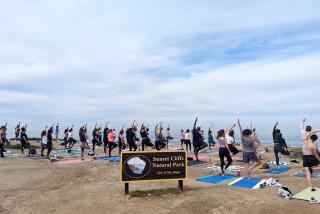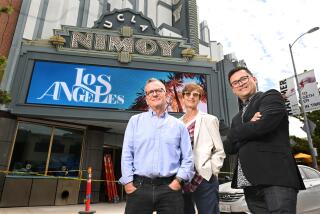ACLU Lawyer’s Letter Backs Shinto Rite at Arts Center
- Share via
The American Civil Liberties Union has weighed into the debate over whether a Japanese ritual planned for Torrance’s new Cultural Arts Center is religious or cultural.
The city has barred parts of the centuries-old ceremony, saying it would violate the constitutional separation of church and state to perform the ritual in a city-owned building. However, an ACLU attorney wrote a letter to Torrance officials this week suggesting their ban is too far-reaching.
The five-part ceremony was to open a Japanese arts and music performance Jan. 10 and 11. Torrance officials have forbidden a Shinto priest’s blessing, the traditional sprinkling of salt and the reading of a poem, contending they are part of a Shinto religious ceremony.
City Atty. Kenneth L. Nelson concluded that the Shinto priest’s blessing would “cross the boundary of church and state,” especially since the city is providing the theater and technical help free of charge.
But ACLU lawyer Carol A. Sobel pointed out that organizers have already canceled the participation of the priest, and she said the sprinkling of salt and the poem are not necessarily religious.
The city runs little risk of “endorsing” any religion by permitting the ceremony with the Shinto priest removed, Sobel said in the letter. “I believe that all ‘sectarian’ elements are out of the program,” Sobel wrote.
The letter is currently under review by Torrance officials.
The controversy erupted when the city objected to the traditional opening ceremony, known as kokera otoshi.
The event’s main organizer, Mikko Haggott-Henson, counters that the ceremony’s purpose is cultural, not religious. But because of the city’s objections, Haggott-Henson removed the Shinto priest, the salt sprinkling and poem from the program, leaving only a percussion performance and a dance.
Meanwhile, Gerald D. Yoshitomi, executive director of the Japanese American Cultural and Community Center in Los Angeles, wrote the city to say the ceremony has a non-religious purpose. He asked the city to rethink its stance.
“I hope the cursory legal opinion and subsequent action by the city of Torrance reflects merely a lack of knowledge and research on Japanese cultural traditions,” said Yoshitomi, who heads the largest ethnic cultural center in the state.
More to Read
Sign up for Essential California
The most important California stories and recommendations in your inbox every morning.
You may occasionally receive promotional content from the Los Angeles Times.










